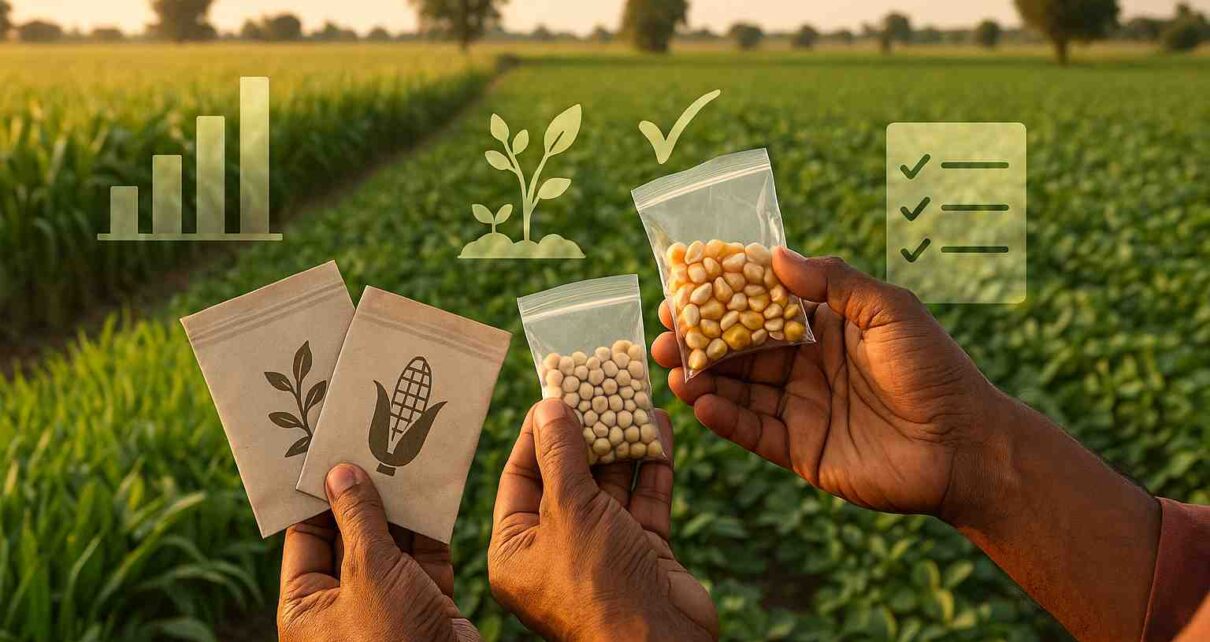When it comes to choosing cucumber seeds for your garden or farm, the decision isn’t always straightforward. Do you opt for hybrid cucumber seeds that promise uniformity and disease resistance, or stick with regular (open-pollinated) seeds that offer heritage flavor and potential for saving your own seeds? This guide unpacks the nuanced differences between hybrid and regular cucumber seeds, helping you make an informed choice based on your growing goals, available resources, and seasonal needs.
In this exploration, you’ll learn about seed performance, yield potential, disease resistance, flavor profiles, cost considerations, and seed-saving possibilities. Whether you’re a home gardener seeking delectable cukes or a commercial grower aiming for consistency, knowing the trade-offs can save you time, money, and regret.
The Basic Definitions
In order to combine desired qualities, such as early maturity, uniform fruit size, or disease resistance, two different parent types are cross-pollinated to create hybrid seeds, which are frequently designated as F1. Regular or open-pollinated seeds, on the other hand, originate from plants that naturally pollinate and yield offspring who are similar to their parents. In contrast to hybrid seeds, which do not breed true and may revert to variable features in following generations, ordinary seeds can be preserved and transplanted with comparatively constant results.
Many gardeners looking for quality and convenience choose to buy cucumber seeds online. This gives access to both hybrid and heritage varieties with detailed descriptions and trusted suppliers.
Yield and Uniformity: Performance on the Field
Hybrid cucumber varieties are prized in commercial production because they often deliver:
- Consistent fruit shape, size, and color, ideal for packing and aesthetics.
- High and reliable yields under optimal conditions.
- Some hybrid varieties exhibit enhanced vigour and early maturity, beginning to fruit in just 40 days.
Regular varieties may be less predictable in yield and appearance, but they often reward patient growers with robust flavour and adaptability. If you’re focused on container gardening or home pickling, inconsistency may not be a disadvantage—it can even lend character.
Disease Resistance and Environmental Adaptability
One of the most compelling reasons to choose hybrids is built-in resistance to common cucumber diseases like powdery mildew, downy mildew, and cucumber mosaic virus. Seed companies invest significant resources in breeding these resistances into hybrid lines, giving farmers a head start in combating disease pressure.
Open-pollinated varieties may lack this inherent protection, meaning you must rely more on management strategies, crop rotation, airflow, and organic treatments. On the other hand, they often show greater resilience in non‑uniform environments and can adapt over seasons with careful selection.
Flavor, Texture, and Culinary Profile
Many home gardeners choose ordinary cucumber varieties for their flavour. Cucumbers that are open-pollinated frequently have rich aromas, crunch, and subtle sweetness. The softer, more consistent flavours that result from hybrid types’ tendency to prioritise uniformity and shelf life over complex taste. While mass wholesalers rely on hybrids for stability and goods that move well, gourmet chefs and pickle makers often seek out heritage cucumbers for their richness.
Seed Saving and Sustainability
For a more self-sufficient garden, regular cucumber seeds are the best option. Plant seeds that are open-pollinated can be readily, sustainably, and inexpensively preserved. It allows you to select traits that flourish in your local climate. Conversely, hybrid seeds lose their hybrid vigour and revert to their parent characteristics when they are stored.
Saving seeds from common cucumbers can enhance biodiversity and reduce costs, making it crucial for gardeners who plant every year or want to save money on seeds.
Cost and Accessibility
In general, hybrid seeds are more expensive than ordinary seeds, sometimes by a factor of two or three. The higher productivity and lower risk of crop loss due to disease, however, can offset the cost for commercial farmers. Because regular seeds are sometimes cheap, especially when bought in bulk or traded, they may be preferred by small-scale or frugal growers.
Situational Considerations for Choosing
Your specific context should guide your decision:
Hybrids are a wise option if you grow on a large scale and want consistency, predictability, and high yield. Whether grown in containers, on terraces, or for personal use, ordinary cucumbers can provide interesting flavours, the ability to save seeds, and pleasure. Which course makes more sense depends on the climate, the resources available, and the expanding ambitions.
“In seed selection lies the future of your harvest—and the identity of your garden.”
FAQs
- Can I save seeds from hybrid cucumbers and expect the same plant next year?
No. Seeds from hybrid plants typically revert to parent variety traits and often produce inconsistent or inferior offspring.
- Do hybrids really yield more than regular cucumbers?
Generally yes, under ideal conditions. Hybrids are bred for uniform fruiting and often start producing earlier and more abundantly than regular types.
- Are regular cucumber varieties more vulnerable to disease?
Not inherently, but many lack built-in resistance found in hybrids. With careful management, regular varieties can still thrive, especially in low‑pressure or organic setups.
When choosing between hybrid and conventional cucumber seeds, you should take sustainability, flavour, control, and purpose into account in addition to plants. Hybrids offer the best yield, reliability, and resistance to disease. Cultivars that are regular or open-pollinated offer historical taste, the ability to preserve seeds, and a tangible connection to traditional gardening.
Your best choice will be influenced by your plot size, culinary goals, setting, and whether you’re growing for excitement or the market. Every seed becomes a deliberate step towards a plentiful crop with careful selection.
Check out more blogs: Which Is Better for Your Farm – Purple or Green Brinjal Varieties?



